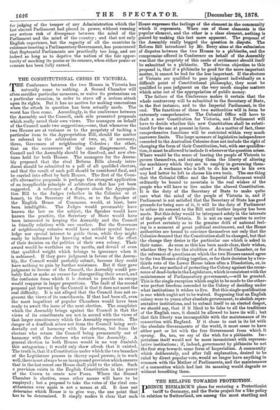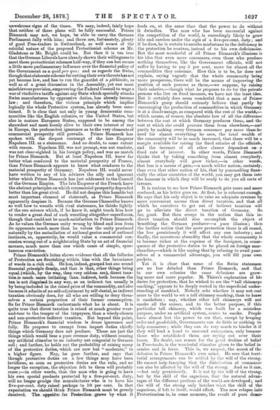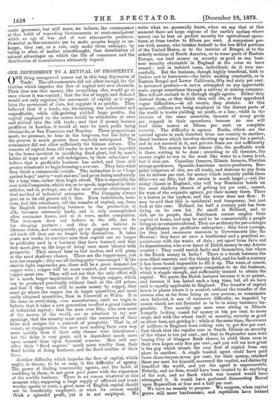THE RELAPSE TOWARDS PROTECTION.
111111RINCE BISMARCK'S plans for restoring a Protectionist 1 tariff to Germany, and the Swiss project for a like policy in relation- to Switzerland, are among the most startling and unwelcome signs of the times. We may, indeed; fairly hope that neither of these plans will be fully successful. Prince Bismarck may not, we hope, be able to cany. the German Parliament fully with him; and there are, fortunately, plenty of good Free-traders in Switzerland, as well aware of the suicidal nature of the proposed Protectionist scheme as Mr. Gladstone or Mr. Bright could be. But then it is too true that the German Liberals have already shown their willingness to meet these protectionist schemes half-way, if they can but secure a little more parliamentary influence over the financial policy of the Government as a quid pro quo : and as regards the Swiss, though that elaborate scheme for cutting their own throats has not yet become law, and has to run the gauntlet of a ple'biscite, as well as of a great discussion in the Assembly, yet one most mischievous provision, empowering the Federal Council to wage a war of vindictive tariffs against any State which specially attacks Swiss manufactures by oppressive duties, has already become law ; and therefore, the- vicious principle which implies logically the whole Protective system., has already, been sanc- tioned. It is clear that not only in young democratic com- munities like the.English colonies, or the United States, but also in mature European States, supposed to be among the shrewdest and most keenly alive to their own interest of any in Europe, the profoundest ignorance as to the very elements of commercial prosperity still prevails. Prince Bismarck has spoken with the deepest contempt of the late Emperor Napoleon.III. as a statesman. And no doubt, to some extent with reason. Napoleon III, was not prompt, was not resolute, was not clear-sighted in his foreign policy, and was no match for Prince Bismarck. But at least Napoleon III. knew far better what conduced to the material prosperity of France, than Prince Bismarck- appears to know what conduces to the material prosperity of Germany. Napoleon III. would never have written to any of his advisers the silly and ignorant letter which Prince Bismarck has just addressed to the Council of the-German Empire. The late Emperor of the French knew the abstract principles on which commercial prosperity depended better than his great rival. He did not despise this humble but most important element of statecraft, as Prince Bismarck apparently despises it. Because the German Chancellor knows so well how to wrestle with rival statesmen, he thinks lightly of the one science which, if he knew it, might teach him how to render a-great deal of such wrestling altogether superfluous, though that could not be much satisfaction to Prince Bismarck. As he values the German unity wrung by blood-and iron from its opponents much more than he values the unity produced naturally by the assimilation of national genius and of national instincts; so, apparently, ,he would velue a commercial con- cession wrung out of a neighbouring State by an act of financial menace, much more than, one which came of simple, spon- taneous conviction.
Prince RismareWs letter-shows evidence that all 'the, fallacies of Protection are flomislaing within him with the luxuriance of weeds in rich soil. He has; indeeclegrasped.but one sound financial principle firinly,.and that, is that, other things being equal(which, by the way, they very seldom are), direct taxa- tion is much more irritating than, , inclireot, both-. because the tax is-not disguised in any way, as an indirect tax usually is by being included in the raised price of the commodity, and also because it admits of-no-sell-adjustment by self-denial, as indirect taxation obviously does, for all who are willing to deny them- selves a certain. proportion of their former consumption. So far Prince Bismarck- understands what- he is about. It is quite true that direct taxation is raised at much greater wear- and-tear to the temper of the taxpayers, than a wisely-chosen and non-protective indirect taxation. But beyond this point, Prince Bismarck's financial wisdom is dense ignorance and folly. He proposes to exempt from import duties chiefly things which Germany- does not produce. These are just the things which would bear a pure revenue duty, without causing any artificial stimulus to an industry' not congenial to German soil ; and further, he holds out the probability of raising many of the protective duties, which are now but "moderate," to a higher figure. Nay, he goes further, and says that though protective, duties on a few things may have been invidious, so soon as protective duties are the rule, and no longer the exception, theobjeotion felt to them will probably cease ;—in other wordsi, that. the man who is going to have his own special products protected by a five-per-cent. duty, will no longer grudge the manufacturer who is to have his five-per-cent. duty raised perhaps 'to 10 per cent. In that expectation we should think Prince Biemarck must be grossly deceived. The appetite!. for Pooteotion.. grows by what- it feeds on, at the same time that the power to do without it dwindles. The man who has been successful against the competition of the world, is exceedingly likely to grow idle and careless under the a3gis of a five-per-cent. duty.; and if he does, he is certain to ascribe misfortune to the deficiency in the protection he receives, instead of to his own deficiencies. But the most wonderful of all Prince Bismarck's illusions is his idea that even mere consumers, even those who produce nothing themselves, like the Government officials, will not suffer by having to pay 5 per cent, more for almost all the commodities they consume. How this is to be, he does not explain, saying vaguely that the whole community being more prosperous, there will be the means of improving the position of such persons as these,—we suppose, by raising their salaries,—though what he proposes to do for the private persons who live on fixed incomes, we have not the least idea. But it certainly does seem wonderful that a man of Prince Bismarck's grasp should seriously believe that partly by encouraging the production of commodities in which Germany is at a disadvantage, as compared with the rest of the worldi- which means, of course, the absolute loss of all the difference between the cost at which Germany produces them, and the cost at which she could procure them from elsewhere,—and partly by making every German consumer pay more than he need for almost everything he uses, the total wealth of the community will be so much increased, that there will be a margin available for raising the fixed salaries of the officials, and the incomes of all other classes dependent on a fixed rate of interest. In other words, Prince Bismarck thinks that by taking something from almost everybody, almost everybody will grow richer,—in other words, that loss is a means of gain,—a much wilder notion, certainly, than even that other notion of his, that by pummelling finan- cially the other countries of the world, you may get them into the humour in which they will be ready to do you all sorts of favours.
It is curious to see how Prince Bismarck gets more and more confused, as his letter goes on. At first, he is coherent enough. He says that his only object is to raise an adequate revenue-by more convenient means than direct taxation, and that all which he contrives to get out of indirect taxation will go to alleviate the direct taxation of Germany. So far, good. But then creeps in the notion that this in- direct taxation should also accomplish the object of benefiting the German producer—a pure illusion ; then the further notion that the more protection there is all round, the less perniciously it will affect any one industry ; and finally, the monstrous absurdity that the whole community is to become richer at the expense of the foreigner, in conse- quence of the protective duties to be placed on foreign mar- chandise,—which is like saying that by refusing to avail your- selves of a commercial advantage, you will fill your. own pockets.
Yet it is clear that some of the Swiss statesmen are no less deluded than Prince Bismarck, and- that in our own colonies the same delusions are grow- ing more and more popular. M. Thiers's explanation of his desire for protection, that he wished to see the "tall chimneys smoking," appears to be deeply rooted in the superficial under- standing of mankind. Nobody asks whether it may not cost more to the world to set a tall chimney smoking, than to- lease it smokeless ; nay, whether other tall chimneys will not smoke all the sooner, and to the better purpose, if this particular tall chimney, which was built for a mistaken purpose, under an artificial system, ceases to smoke. People have almost lost the power to see that, except by keeping order and good-faith, Governments can do little or nothing to help commerce ; while they can do very much to hinder it if they will lend a hand to unsound enterprises, only because those who established them are crying out over their losses. No doubt, one reason for the great decline. of belief in Free-trade, is the wonderful stimulus given to the belief in armies and in force. This is, we suspect, the secret of the delusion in Prince Bismarck's own mind. He sees that terri- torial arrangements can be settled by the will of the strong. He cannot help fancying that the distribution of commeree can also be affected by the will of the strong. And so it can, —but only perniciously. It is not by the will of the strong, but by the skill of the sagacious, that the natural advan- tages of the different portions of the world are developed ; and the will of the strong only botches what the skill of the sagacious, if left to itself, would effect. The new relapse into Protectionism is, in some measure, the result of pure dew- cratic ignorance, but still more, we believe, the consequence of that habit of regarding Governments as semi-omnipotent which an age of war and of vast armaments produces. Powerful as Governments are to make peoples happy or un- happy, they can, as a rule, only make them unhappy, by trying to alter, of malice aforethought, that distribution of natural advantages on which the life of commerce and the distribution of manufactures ultimately depend.




































 Previous page
Previous page